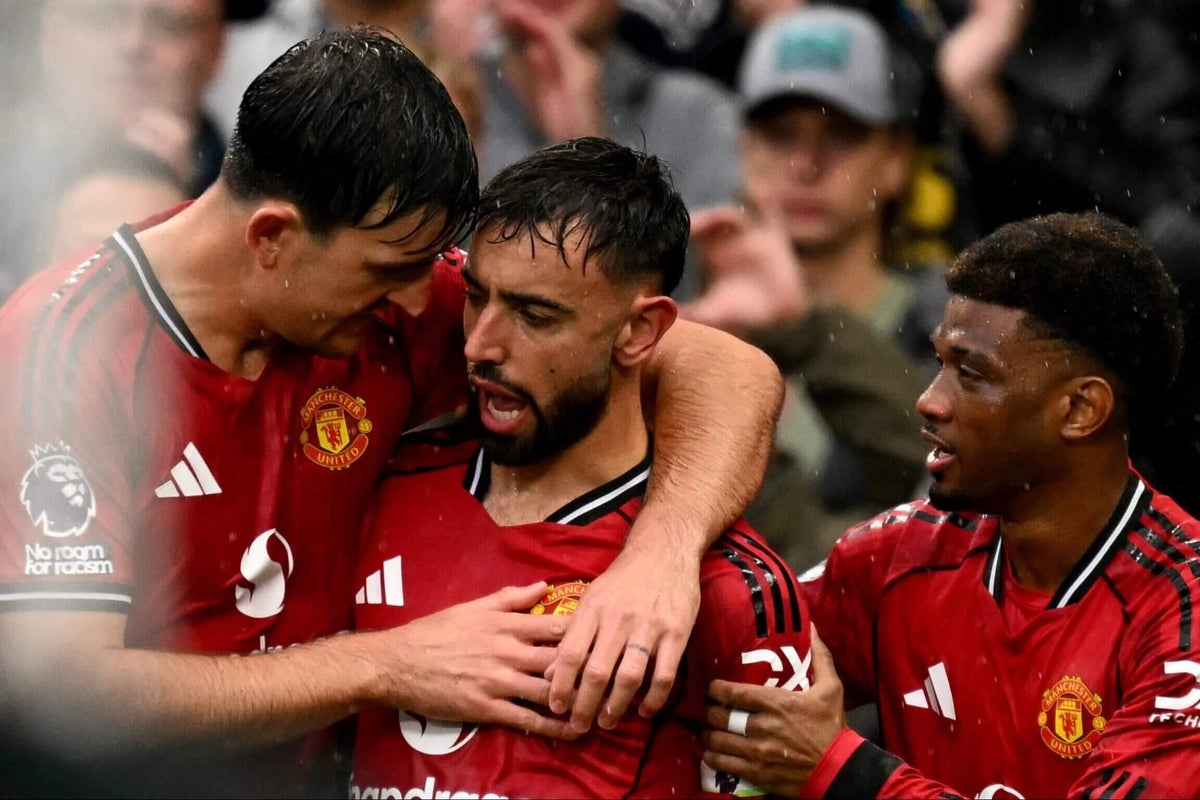There are footballers who like football. There are footballers who love football. Then there are footballers, such as Bruno Fernandes, who seemingly live football.
This was a weekend to remember for Manchester United captain Fernandes, who scored his 100th goal for the club in his 200th Premier League game wearing their shirt.
“Every goal is important. It doesn’t matter the moment,” the 31-year-old said after netting the opener in Saturday’s 2-1 home win against Chelsea. “It is a big moment for me reaching that milestone: massive for a massive club. I’m very happy. I won’t hide from that. It was not something that I was trying to achieve when I came to the club. I just wanted to do the best that I could.”
Fernandes has become the lighthouse of modern-day United; an important, shining beacon that has brought relief and respite to fans, team-mates and multiple managers/head coaches since his arrival in January 2020.
When the team find themselves faced with a tactical problem, it often falls to the Portugal international midfielder to solve it. Across five full seasons and parts of two others, he has scored goals, created them for team-mates, attempted to lead their pressing game and tried to galvanise a fractured football club. A player somehow impervious to the footballing malaise that has seen so many post-2013 signings at United come unstuck. One who has squeezed more creative juice from the series of suboptimal squads surrounding him than he has any right to.
When one looks at the 12 years of the club’s post-Alex Ferguson era, there’s Bruno Fernandes and then comes everything else.
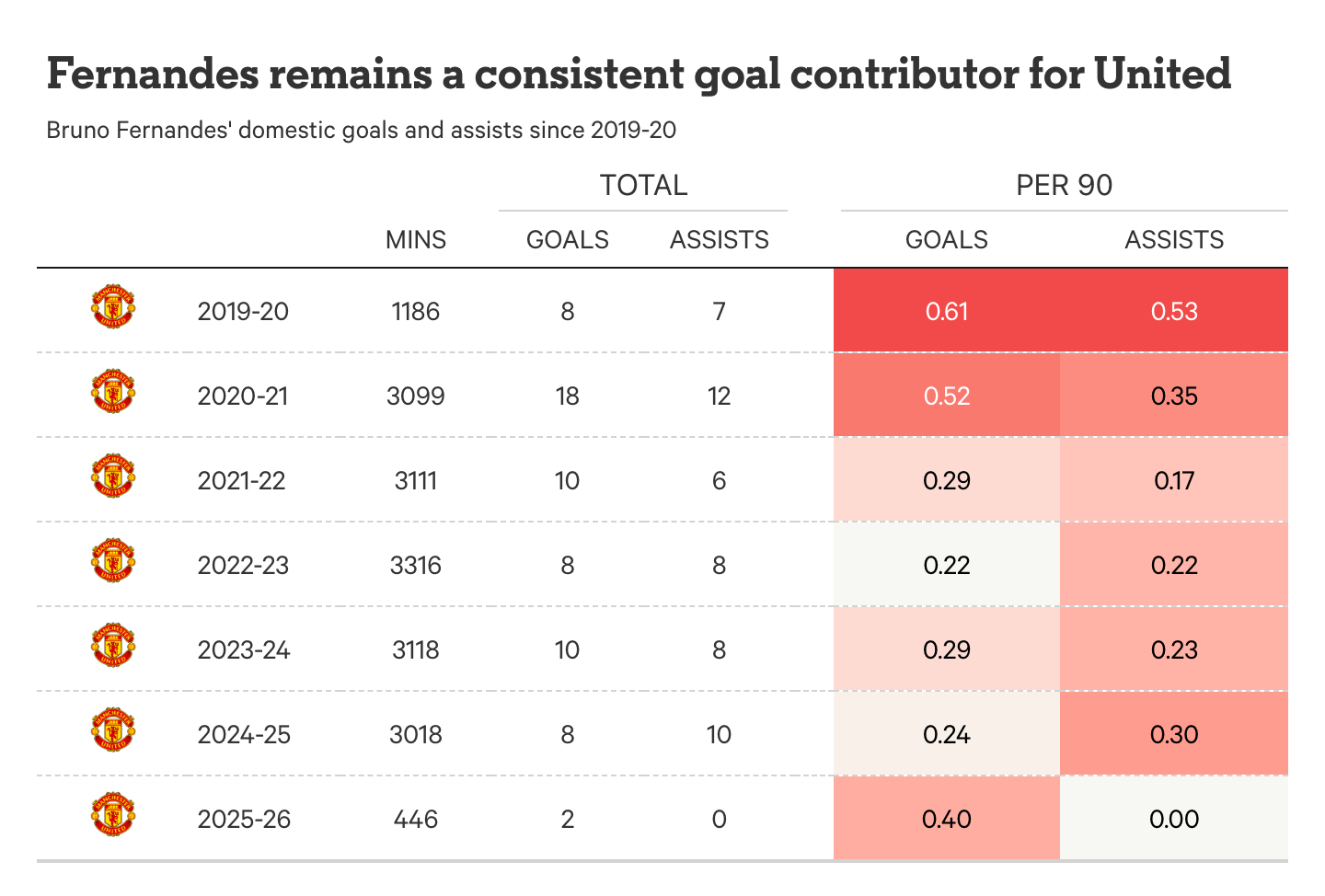
Four Player of the Year accolades at the club (2019-20, 2020-21, 2023-24 and 2024-25), along with 13 of United’s Player of the Month prizes, speak to his on-field importance.
Away from the pitch too, Fernandes goes the extra mile to be present at United’s academy and women’s matches where possible. And in the lead-up to the 2024 FA Cup final, he approached executives from co-owner IEOS and offered to personally pay for travel and accommodation for staff members at the club travelling to the game in London.
He is the beating heart of his football club. A gung-ho improviser who paints using a different colour palette compared with the majority of attacking midfielders in the Premier League.
“That is the most important thing — the influence he has on the squad,” said United head coach Ruben Amorim of his skipper on Saturday. “The point of the captain is to be the best he can be in every situation to make the team better.”
Forty-two players have scored for United since Fernandes’ debut in February 2020. None of the other 41 have been more conducive to the club earning victories: 30 of his 100 goals have put them one ahead in matches, 21 have been outright winners.
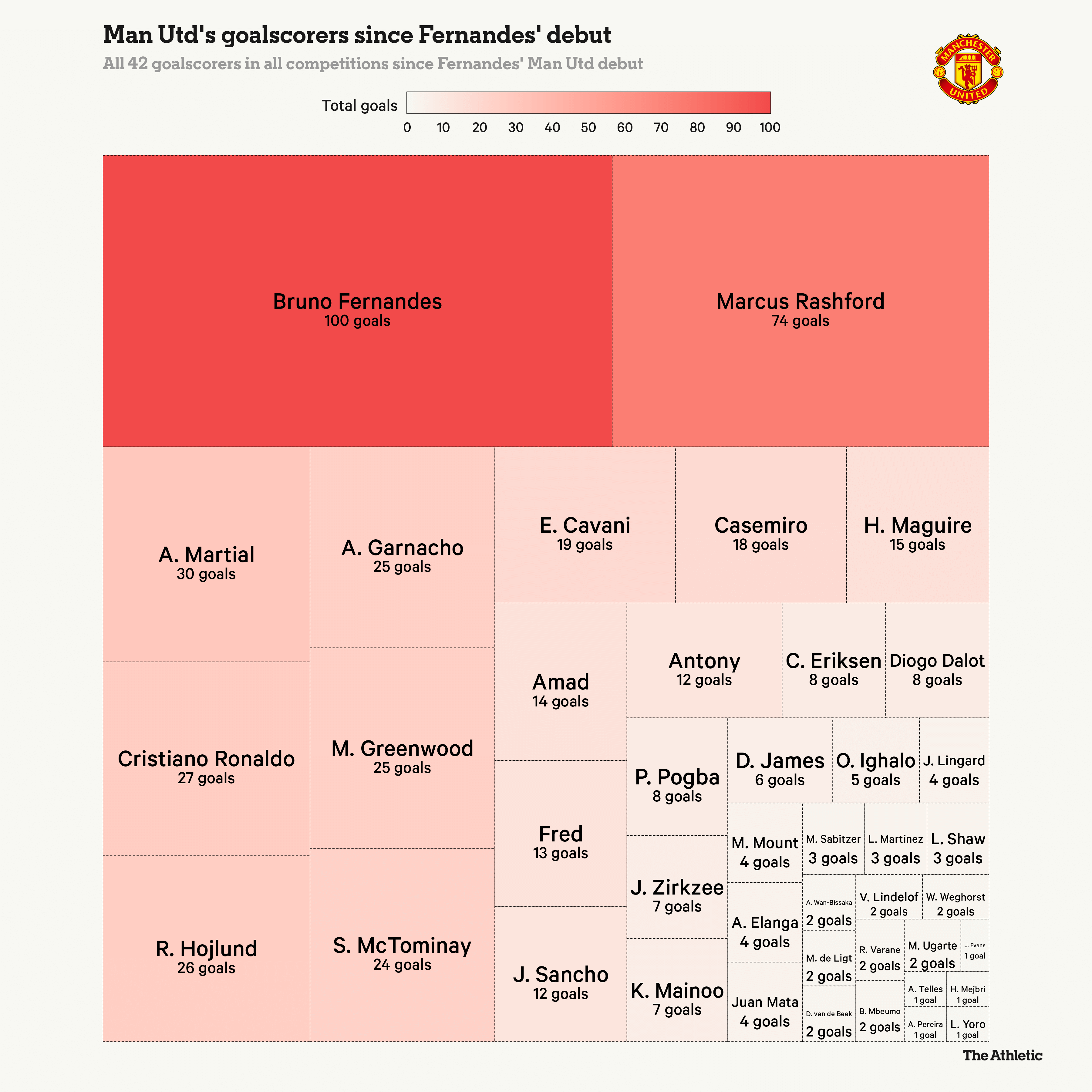
It’s worth rewinding to that 2019-20 season and the creative vacuum in midfield which Fernandes initially filled. Paul Pogba was waylaid by injury after talking up a possible move to Real Madrid at the end of it, Jesse Lingard and Andreas Pereira took turns in the No 10 position, and United lacked a degree of finesse when getting the ball from Point A to Point B.
In came Fernandes on January 30, and while the playmaker didn’t catch fire during his debut in a home goalless draw with Wolverhampton Wanderers a couple of days later, things quickly improved. The Portuguese closed out the second half of the season like a man who had turned up late to a party and was keen to make up for lost time.
That July, The Athletic outlined his high-risk/high-reward approach to passing. Where other attacking midfielders tried to give equal weight to ball progression and retention of it within the final third, Fernandes sought to be an attacking catalyst whenever possible. It’s an approach that can frustrate, and would likely fail if taken on by a less skilled or less confident footballer. Yet Fernandes — on the whole — makes it work. His eyes dilate when others opt to blink, his runs in and around the penalty area creating a rising tide that team-mates can build upon.
His reward for those first few months at Old Trafford was to be voted United’s player of the season — despite a mere 14 top-flight appearances after his move from Sporting CP, Fernandes quickly became the superstar around whom his new team’s many attacking bodies orbited.
Their run to the delayed Europa League semi-finals in the August (playing two single-leg knockout ties during a pandemic-enforced mini-tournament in the German city of Cologne) meant there was only a 35-day break between the end of United’s 2019-20 season and the beginning of the next one. But his first full campaign in England allowed fans (who had to watch the games on TVs and other screens due to closed-door footballing rules designed to slow the spread of Covid-19) to get a better sense of Fernandes’ other stellar trait.
For some reason, he appears almost immune to the effects of lactic acid or poor sleep.
A 2022 interview with The Athletic saw Fernandes make mention of his love of chocolate cereal, which may help with his recovery, but for the most part, it is unclear how man who turned 31 earlier this month remains immune to the aches and pains that have seen so many of his contemporaries succumb to injury, cramp, or the usual forms of discouragement that occur across a season.
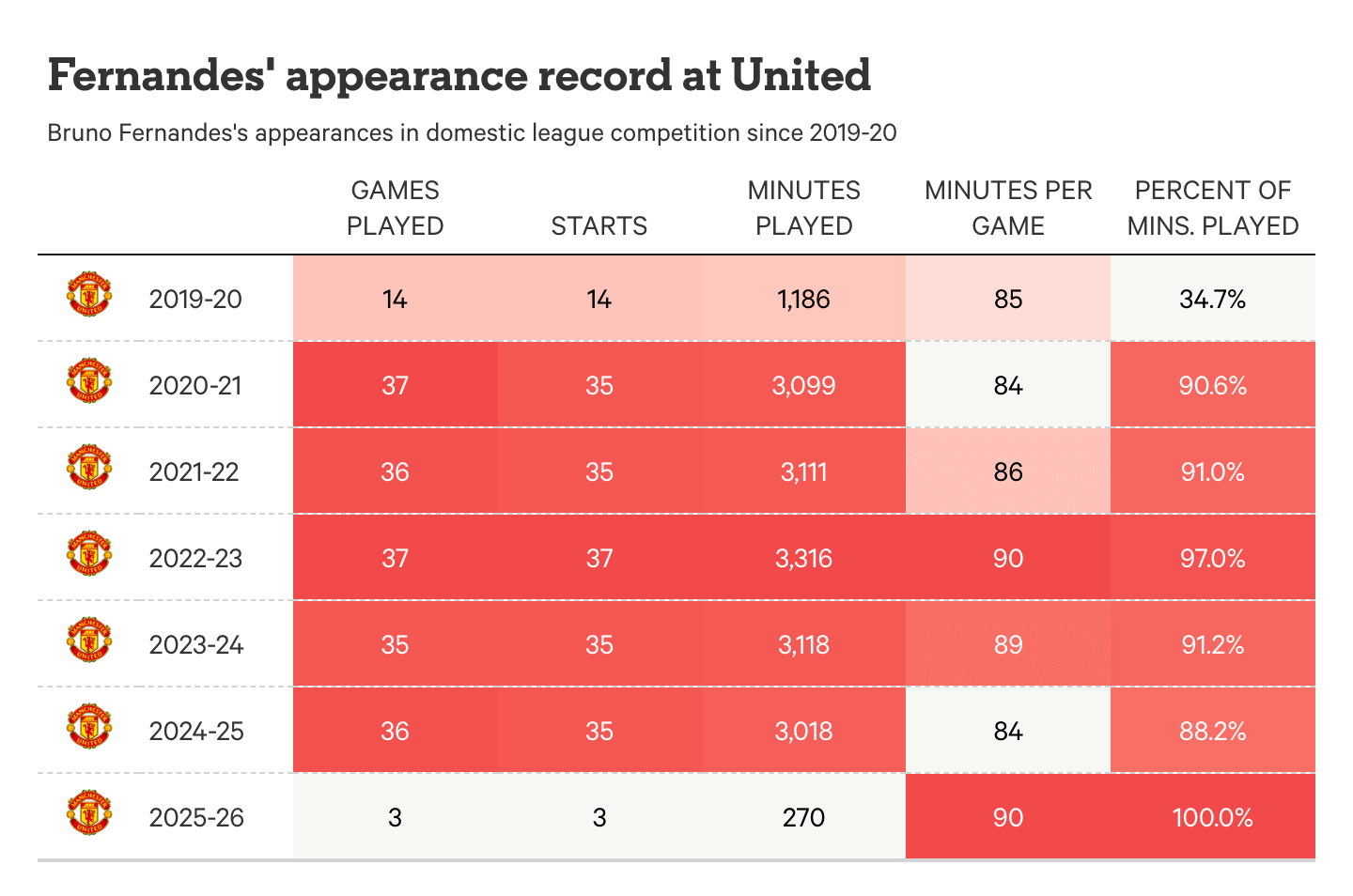
Rival fans may argue over Fernandes’ position among the Premier League’s best playmakers, but his importance and effectiveness for United remain undeniable.
In a more ideal universe, his ability to get a lot out of a little should have seen him provided with a more functional team overall, allowing him to focus on his strengths, while others cover for his weaknesses. In this universe, his knack for getting a lot out of a little saw him pushed to near breaking point while the club attempted to deal with issues elsewhere. And yet, he strives to find ways for his team to win.
Amorim’s arrival last November has led to Fernandes being redeployed as more of a box-to-box midfielder compared to his previous outings in a more creative role, yet he still finds a way to shoulder a ridiculous burden in that area of the game and conjure artful images out of footballing static: no player attempted more one-touch passes in the final third last season. There is “making things” happen, and there is the Fernandes approach.
Then there’s his approach to penalties. His ability to win them has been honed with a cunning focus. His ability to convert them is near perfect. Fernandes is not the only practitioner of the hop-skip-and-jump run-up on spot kicks, but the way he can apply both pace and placement to the shots that follow makes him one of the best penalty-takers in the world.
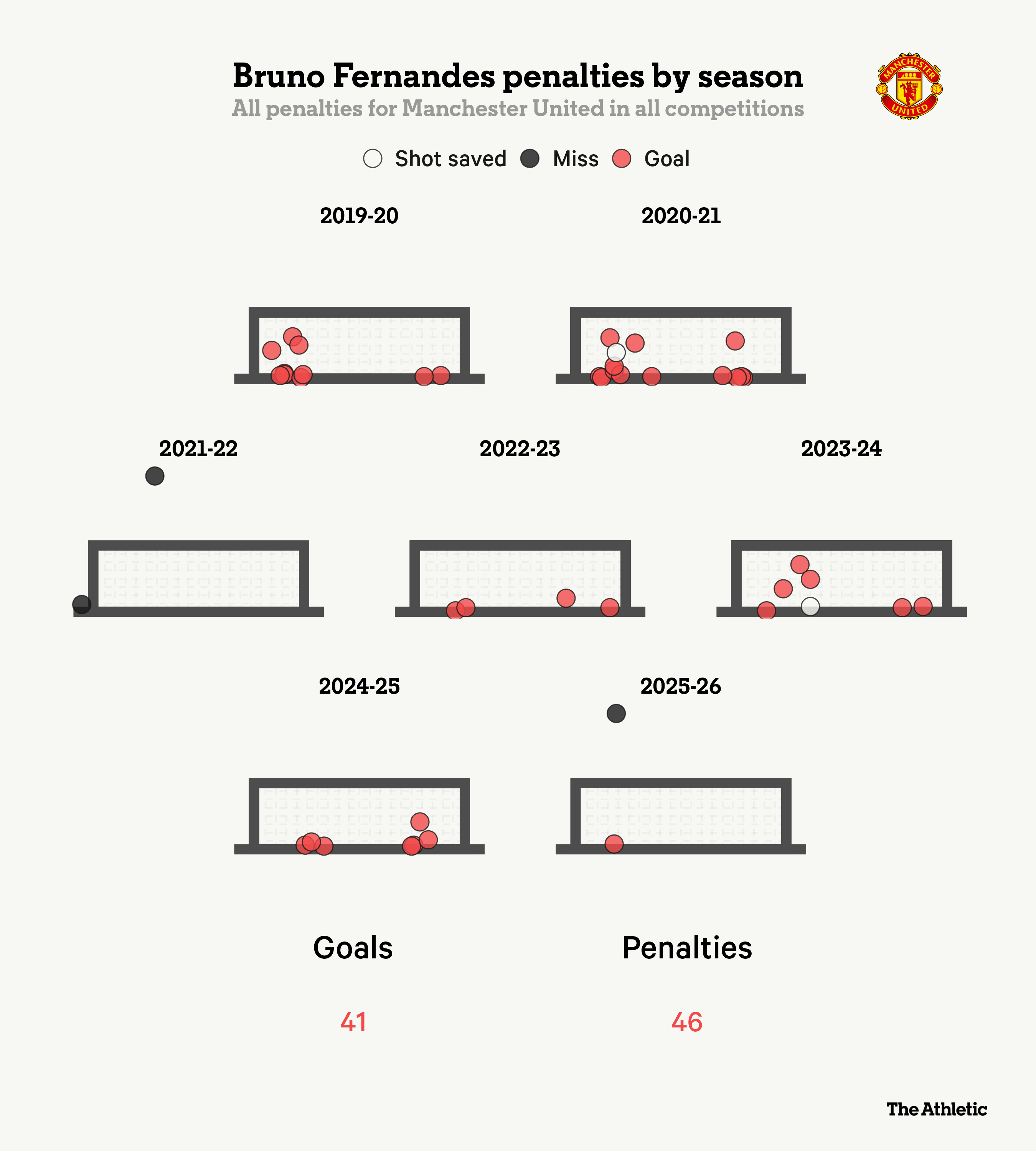
So, what next for this unorthodox player looking to wrestle a dysfunctional football team back from the brink?
For all of his goals and many flashes of brilliance, Fernandes can be a divisive figure. Former United captain turned TV analyst Roy Keane believes him to be a poor leader of a United side sinking further into mediocrity. Opinions were split in the summer when it became known that Saudi Arabia’s Al Hilal were willing to pay north of £80million (around $108m at the current rate) for his services. Should a player who thrives in unstructured and improvised moments be so crucial to a club looking to put their chaotic past 10 years or so behind them?
Fernandes has waited, in footballing terms, an age for a United team to match his on-field energy, ambition and application, but after his own disappointing showing in last season’s Europa League final loss to Tottenham Hotspur, that day looks to be further away than he’d have hoped.
He is a totemic figure for the good and sometimes bad playing methods of a club who crave success but haven’t figured out how to go about achieving it. Such is Fernandes’ approach to problem-solving, if you were to ask him to find a needle in a haystack, you can imagine him setting fire to it before getting out a metal detector.
A man who plays football with an urgency most people only find when they are running downhill has scored 100 goals for Manchester United. That should be celebrated.
He isn’t to everyone’s taste, but there’s no mistaking Fernandes’ importance to modern-day United.
(Top photo: Fernandes celebrates scoring against Chelsea on Saturday; Oli Scarff/AFP via Getty Images)
